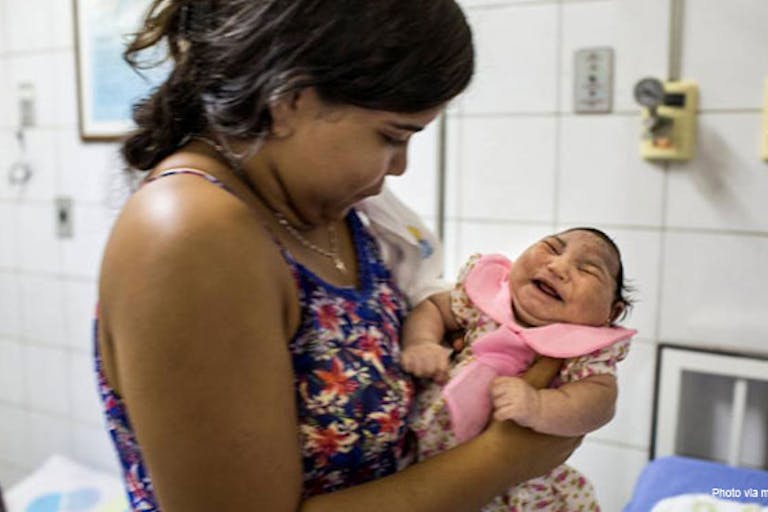
Report: Kansas abortions hit record high with 47% increase in minors
Nancy Flanders
·
Issues·By Catherine Livingston, PhD
Disturbing new poll: Americans support late-term abortion for Zika virus
A troubling new poll from Harvard University shows that a majority of Americans are willing to support abortion after 24 weeks, when a preborn baby is viable, if the mother has the Zika virus and there is a potential likelihood the baby might have microcephaly.
The poll’s report, entitled “Zika Virus and the Election Season,” was conducted by STAT and Harvard T.H. Chan School of Public Health, and used a random sampling of Americans; the margin of error for each poll is ±3.62 percentage points. It sought to survey:
Public views of who is to blame for congressional inaction to fund Zika virus response efforts
Public support for an exception to late-term abortion restrictions when pregnancies are affected by Zika virus
Public perceptions of which presidential candidate will do a better job handling the Zika virus outbreak
But it was Americans’ perceptions on late-term abortion that proved the most surprising and serious:
A majority of Americans (59%) believe a woman should have access to a legal abortion after 24 weeks if she has been infected with Zika virus and has been told by a health professional that there is a serious possibility the baby would be born with microcephaly.
The poll reports:
Cases of Zika virus infection may lead to a debate about late-term abortion in this year’s elections because Zika virus is associated with microcephaly, a severe birth defect that includes an abnormally small head and brain damage. Microcephaly is not typically diagnosed until the late second or the third trimester, and in manystates, women cannot obtain a legal abortion after 24 weeks unless her life or her health is at risk.
To contrast, the poll authors say, they also asked about attitudes toward late-term abortion in a separate poll not related to the Zika virus. The results of both are a striking contrast:

The poll reported a partisan difference in responses:
72% of Democrats compared to 48% of Republicans in favor of legal abortion after 24 weeks in the Zika virus scenario. This reflects a substantial rise in support among both parties as compared to views about late-term abortion in general, where 34% of Democrats and only 12% of Republicans support abortion after 24 weeks.
Senator Marco Rubio said Saturday he does not support abortions for pregnant women with the Zika virus. Rubio has taken a lead on stopping Zika’s spread. He told Politico:
I understand a lot of people disagree with my view – but I believe that all human life is worthy of protection of our laws. And when you present it in the context of Zika or any prenatal condition, it’s a difficult question and a hard one. But if I’m going to err, I’m going to err on the side of life.
However, the results of this poll show a disturbing trend of a culture that devalues life when it may not be “perfect.” As Live Action News reported, the media has used the Zika virus to strike fear in the hearts of people to push a pro-abortion agenda. In truth, “For most people, the virus only causes mild symptoms, but in pregnant women, it can cause their babies to be born with microcephaly, a birth defect that causes babies to have developmental disabilities and small heads.”
But what if a baby is born with microcephaly? Does the condition make baby any less a person with value? Live Action News’s Danny David reported on 24-year-old Brazilian journalist Ana Carolina Caceres, who has microcephaly and has made it her mission to advocate for persons with her condition. Caceres said:
… [T]he health minister… said that Brazil would have a “damaged generation” because of microcephaly. If I could speak to him, I would say: “What is damaged is your statement, sir.”
… I believe that those who have abortions are not giving their children a chance to succeed.
In another story, Live Action News’s Nancy Flanders reported on two daughters in the Hartley family who have microcephaly (though the cause was not known to be Zika). While the diagnosis wasn’t easy to embrace, Gwen Hartley said:
We were devastated initially, but this soon passed as we realized that this was the same child that we waited nearly five years to conceive, the same child that we wanted desperately, and the same child that we loved with everything in us, regardless of the size of her head.
The facts about Zika and its dangers have been greatly exaggerated as well. Live Action reported in March about the facts and myths of Zika, including the fact that in two nations known for high microcephaly numbers, the link between Zika and microcephaly has not been proven:
The scientific community is still uncertain about the link between the virus and microcephaly; as of today, it is only strongly suspected. While this ongoing public health situation has many unknowns, International Planned Parenthood Federation and other groups are rushing to present one solution: abortion.

Also debunking the fear and presumed “need” for abortion is the fact that researchers have already made promising strides on a vaccine for the Zika virus. Some abortion advocates insist abortion is the answer for Zika. One researcher even testified before a congressional panel that fetal tissue is needed to find a Zika vaccine. As Live Action News reported, Dr. Lawrence Goldstein told the Select Panel that “if you want to understand the Zika virus, the most efficient place to start is with the fetal tissue that is infected. That just seems self-evident to me.” But it’s not evident at all. Quite the opposite is shown to be true. The Washington Post reported:
The promising results bode well for efforts to develop a Zika vaccine. Zika and dengue are in the same family of viruses, and NIH officials have said they hope to cut the timeline for having a Zika vaccine by building on their work on dengue.
The story added that making a vaccine for the virus “should be quite feasible” based on knowledge of its structure and DNA.
That “the public is likely to be accepting of a Zika virus-related exception for abortion after 24 weeks” is a troubling report that shows the permeation of fear rather than rationality. Even if there were conclusive evidence that a baby were to be born with microcephaly, he or she is still a baby — a living person in the womb, who deserves a right to live, like any other, without being discriminated against.
Live Action News is pro-life news and commentary from a pro-life perspective.
Contact editor@liveaction.org for questions, corrections, or if you are seeking permission to reprint any Live Action News content.
Guest Articles: To submit a guest article to Live Action News, email editor@liveaction.org with an attached Word document of 800-1000 words. Please also attach any photos relevant to your submission if applicable. If your submission is accepted for publication, you will be notified within three weeks. Guest articles are not compensated (see our Open License Agreement). Thank you for your interest in Live Action News!

Nancy Flanders
·
Issues
Nancy Flanders
·
Issues
Bridget Sielicki
·
Issues
Angeline Tan
·
Issues
Nancy Flanders
·
Issues
Wesley J. Smith
·
Human Interest
Catherine Livingston, PhD
·
International
Catherine Livingston, PhD
·
Newsbreak
Catherine Livingston, PhD
·
Human Interest
Catherine Livingston, PhD
·
Human Interest
Catherine Livingston, PhD
·